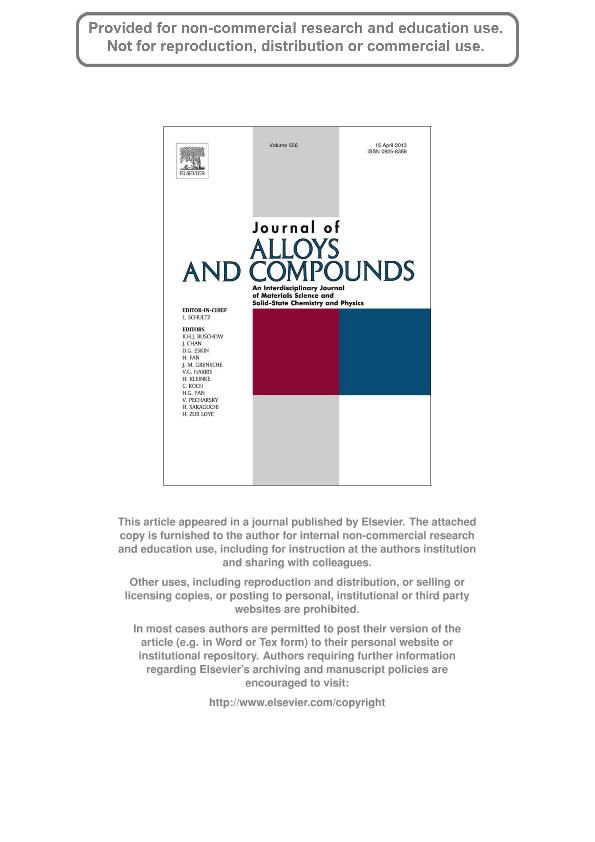Artículo
On the perfect MgH2(-Nb,-Zr) systems and the influence of vacancy-like defects on their structural properties. A self-consistent first principle calculations study of the electron and positron parameters
Luna, Carla Romina ; German, Estefania
; German, Estefania ; Macchi, Carlos Eugenio
; Macchi, Carlos Eugenio ; Juan, Alfredo
; Juan, Alfredo ; Somoza, Alberto Horacio
; Somoza, Alberto Horacio
 ; German, Estefania
; German, Estefania ; Macchi, Carlos Eugenio
; Macchi, Carlos Eugenio ; Juan, Alfredo
; Juan, Alfredo ; Somoza, Alberto Horacio
; Somoza, Alberto Horacio
Fecha de publicación:
01/2013
Editorial:
Elsevier
Revista:
Journal of Alloys and Compounds
ISSN:
0925-8388
Idioma:
Inglés
Tipo de recurso:
Artículo publicado
Clasificación temática:
Resumen
The electronic and structural properties of MgH2 systems containing vacancies and Zr or Nb as dopants were studied using self-consistent calculations. The density of states were computed using the Vienna Ab initio Simulation Package (VASP) and the orbital overlap population weighted DOS with the Amsterdam Density Functional program. The metal–metal and metal–hydrogen bonds in the perfect hydride and this material containing a neutral Mg or H vacancies or a neutral mixed Mg–H vacancy complex were analyzed. The same calculations were also performed in the magnesium hydride with a Nb or a Zr atom as a substitutional impurity and on these systems containing the above mentioned vacancies. Simultaneously, the influence of vacancies in the hydride was studied through the calculation of the positron lifetimes and the positron–electron momentum distributions in the previously referred materials. Secondly, information on the influence of vacancies on the electron momentum density of the MgH2(–Nb,–Zr) systems was additionally obtained through the calculation of the positron–electron momentum distributions. The results obtained indicate that in the pure hydride the presence of vacancies and impurities notable diminishes the force in the atomic bonds. The stability decrease of the bonds was correlated with changes in the positron wave function in the same sites of the structures. Moreover, it was found that these changes in the positron wave function are in good agreement with the decrease of the positron lifetimes.
Palabras clave:
Mgh2
,
Vacancy
,
Positron
,
Hydrogen
Archivos asociados
Licencia
Identificadores
Colecciones
Articulos(CCT - TANDIL)
Articulos de CTRO CIENTIFICO TECNOLOGICO CONICET - TANDIL
Articulos de CTRO CIENTIFICO TECNOLOGICO CONICET - TANDIL
Articulos(CIFICEN)
Articulos de CENTRO DE INV. EN FISICA E INGENIERIA DEL CENTRO DE LA PCIA. DE BS. AS.
Articulos de CENTRO DE INV. EN FISICA E INGENIERIA DEL CENTRO DE LA PCIA. DE BS. AS.
Articulos(IFISUR)
Articulos de INSTITUTO DE FISICA DEL SUR
Articulos de INSTITUTO DE FISICA DEL SUR
Citación
Luna, Carla Romina; German, Estefania; Macchi, Carlos Eugenio; Juan, Alfredo; Somoza, Alberto Horacio; On the perfect MgH2(-Nb,-Zr) systems and the influence of vacancy-like defects on their structural properties. A self-consistent first principle calculations study of the electron and positron parameters; Elsevier; Journal of Alloys and Compounds; 556; 1-2013; 188-197
Compartir
Altmétricas



